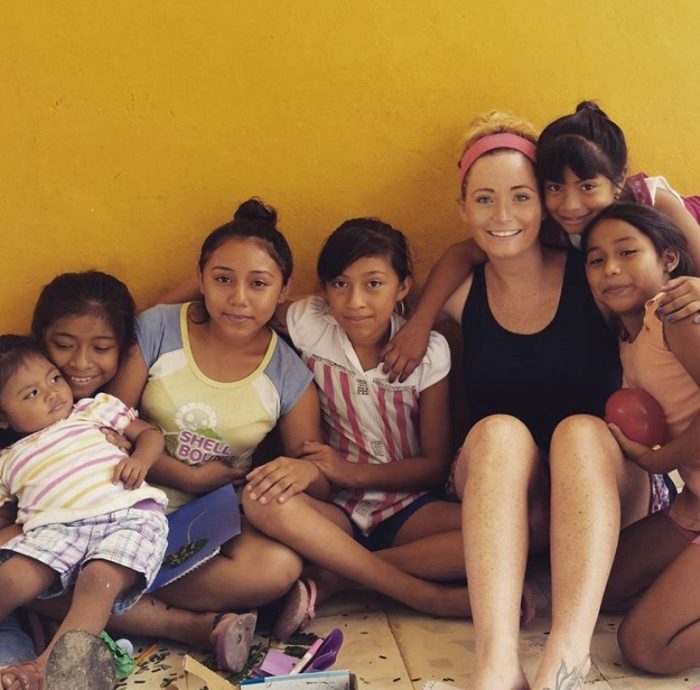We are all ready for bed when we hear the knock.
It’s unusual but not unheard of for someone to show up on Dad’s porch this late—however, we know instinctively that something is wrong. The hard, fast rapping on the door seems desperate, impatient. I suppose that’s why we all get up and follow him to the door.
Dad isn’t one to be frightened. In fact, if the eager intruder were to turn the knob, they would find the door unlocked.
Dad doesn’t believe in locked doors. He keeps a loaded pistol at the front and back doors, a shotgun in his bedroom closet, and a 140-lb shepherd, mean as hell, in the back hall. Dad always says if someone wants to come in, let them—he’s got something for ‘em. Harley knows something is up too. We hear him bellow from the back of the house as we crowd around Dad at the front entrance. He glances over his shoulder at me, and I grab the hands of my two sisters and pull them back a few feet.
I can barely see the woman from where I’m standing. She’s blonde and thin, real thin. I don’t recognize her, but Dad must. The dog barking drowns out their first exchanges. I edge closer.
“Do you mind if Tiffany stays here tonight? We don’t mean to barge in on you. I know that sounds crazy. But please, will you just let her stay here? I’ll be back to get her first thing in the morning.”
For a moment, all I know is that she needs help and I want us to help her. I’ve been looking up, eyes on the back of my dad’s head, but movement at the woman’s knee grabs my attention, and I notice the little girl. Also blonde. Also very thin. And shaking just like her mama. Her neon pink nightgown makes her look smaller somehow, frailer, like the snowy-white porcelain doll Grandma won’t let anyone touch.
Dad doesn’t miss a beat.
He drops down to eye level with Tiffany, asks her how she feels about popcorn and Koolaid, and pulls them both into the house. He shuts the door behind our visitors and leaves the woman standing there while he introduces Tiffany to us. Tiffany is young, four or five at the most. When I mention “Finding Nemo,” she nods her head and dances toward the DVD collection.
Dad starts the coffee pot and hands the woman a cigarette before speaking.
“You can stay here. You’ll be safe.”
I watch her shake her head. When she moves the wobbly cigarette toward her lips, her face falls under the yellow kitchen light and I see the dark eye, her swollen lips caked a muddy brown.
“I’ll go over there right now and handle this.”
This time she shakes her head violently.
He pours her coffee and stays silent while she sips at the mug unsteadily. He touches his own cup to his lips.
“I can call the cops and let them handle it.”
At this, she sets her coffee cup down, drags on the Winston, and looks at Dad mockingly.
“It’s Vern, right? Well Vern, thank you for helping with my little girl. That’s really all I need from you.”
She glances at Tiffany, sandwiched between my sisters on the couch, before she turns and walks out the front door.
Tiffany stays with us the rest of the weekend. She doesn’t talk much, but she eats and bathes and carries around my sister Morgan’s old pink doll. She’s named it Kelly. Eventually, her mama comes back to get her. Dad tells Tiffany to keep Kelly and invites her to stay over whenever. This is an invitation she gladly accepts. Tiffany begins showing up regularly. She comes in the night and stays a few days, or she drops by for dinner and a princess movie before trudging back across the street to her own yard. One day there’s a moving van, and Tiffany’s visits stop altogether.
My dad never asked for compensation. He never once turned Tiffany away. He never told her mother it was about time that the little girl’s frequent visits stopped. He never counted up how many dinners or cups of Koolaid or rides to school he was owed. He never thought of that woman as weak or worthless or dumb or helpless or lazy. Even after she wound up in the hospital for three days and then went right back to that house, Dad never said a bad word about her.
He knew there were good and bad things in the world, and he was glad that the woman had been brave enough to walk her little girl over to his front door that first night. In fact, he took a bit of pride in the fact that she had trusted him with her daughter. It made him feel good to be helping her. He was happy to do what he could for them. He would have done more too. He would have busted that guy’s ass if she’d have nodded her head when he asked. He would have let her and her daughter stay as long as they needed. He would have never expected anything in return.
I believe that most Americans are like my father. I believe most people wouldn’t hesitate to help the vulnerable. I think most people would invite into their own home a parent trying to shield a child from violence and the like. I think most people would show compassion rather than contempt for the desperate, injured, and unprotected. And I think most people wouldn’t expect any reward for their basic humanity.
This story, of my father and Tiffany and the woman with the black eyes and shaky hands, is what I think of when I read about the zero-tolerance policy.
When I hear of the children being ripped from their parents’ arms and taken to detention centers. When I imagine those children—alone, terrified, trembling—calling out to parents who do not come. When I close my eyes and see those parents begging behind bars for their children, throwing out their arms but not being heard or felt. I imagine that woman standing in front of our door, with Tiffany’s little fingers clutched tightly at the bottom of her t-shirt, and Dad sweeping them both inside without hesitation.
The current policy subjects asylum seekers to criminal prosecution. It tears apart families, putting parents in jails and children in detention centers. Some children may have to plead their cases themselves without a lawyer. Just so we are clear, these are not young adults and teenagers only. We are talking about toddlers, about babies. They have no clue when and if they will see their parents again. And if they are deported back into the violent, poverty-stricken areas they were fleeing, it is often left to corrupt, disorganized governments to reunite them with their families. This amounts to a death sentence for many children. Even the lucky ones will not walk away from this without severe trauma.
Reports estimate that the number of children separated from their parents is nearing 1,000 and will eclipse 4,000 by the end of summer.
Take this personally.
What would you do if a stranger were to steal your child from your very arms? What would you do if you were taking a great risk to save your child from violence only to be treated like a criminal and lose that child anyway? What would you do? Undoubtedly, this question is tough, maybe impossible, for us as Americans. It is simply not a reality. The parents reading this are thinking something like, “To hell with that, I’ll be damned if someone thinks they can take my babies from me.”
The fact is, under no circumstances is this treatment humane. The fact is, there is no excuse, no circumstance that validates this policy. It is a crime.
Yet, we turn our eyes from it. We ignore it. We say it is different—they are illegals; they have broken the law. We don’t acknowledge our own government’s horrendous crime. We don’t acknowledge that in many cases, these parents are fleeing violence and extreme poverty to give their own children a chance at life. We don’t acknowledge that we’d do the same thing in a similar circumstance. We say it is different because they are different. Their skin is darker. They were born somewhere else. They speak a different language. They are other. Therefore, it must mean that we are better, smarter, and harder working. And this invisible, impossible lie about our “differences” allows us to turn our heads and say, “Not my business.”
The truth is, we are the same. They are us.
We are all mothers, fathers, sisters, brothers, daughters, sons, and humans.
We say they are different, but they are us and have always been us. And so, we must ask ourselves, what would we do if our babies were in danger? What would we do if a desperate mother or father knocked on our front door? We have been silent too long. And our silence equals complicity.
It is our business. I learned many years ago from a steaming cup of coffee and flickering cigarette that doing the right thing is everybody’s business. We cannot close the door and pull the blinds. We must spread the word, share the horrendous stories, and demand action from our political leaders. We must hold one another accountable. We must be heard. Through our voices, others will gain the courage to speak.
I believe that most Americans are like my father. I believe that we really want to say, “Come on in. There’s Koolaid in the fridge and popcorn in the microwave. You are always welcome here.” I believe, despite our policies, that we all share basic humanity. And I believe that we can change the world just by refusing to be silent.
C’mon America, be brave.
~











Read 24 comments and reply